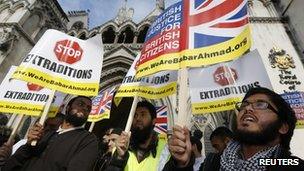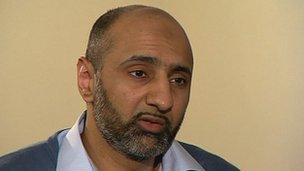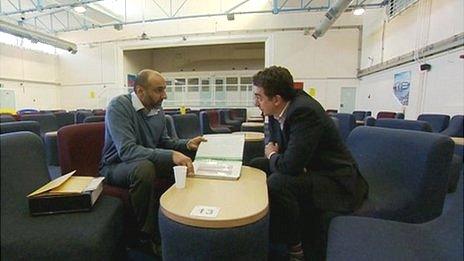New trial location rules follow terror extraditions
- Published
- comments

Protests: Babar Ahmad's supporters at the High Court
The Crown Prosecution Service has published new guidelines which say that people accused of crimes which cut across national boundaries should be tried in the country where most of the alleged offending occurred.
This comes weeks after it said it could not intervene in the extradition of two men who said their crimes were committed in the UK.
The document is part of the changes that are being introduced to how the UK deals with extradition arrangements with the United States and other nations.
The document and its recommended approach , externalto these complex cases comes three weeks after two British men, Babar Ahmad and Talha Ahsan, failed to halt their extradition to the US despite arguing their alleged offences occurred in the UK.
I'll come back to their case later - but first let's look at the CPS's guidelines. They've come into force as of now - but are subject to review following consultation in the weeks to come.
The problem the CPS is trying to solve is this: if both the UK and another nation want to prosecute someone for the same crime, where should that individual stand trial?
We are going to see increasing numbers of these kinds of cases in the years to come because globalisation has made it easier for crimes to be committed across borders, particularly where the internet is one of the tools used by offenders.
The new guidelines say that the starting point should be some kind of joint approach to investigation between two nations, so that law enforcement agencies in each country are clear what the other is doing and why. That relationship should include sharing information so that prosecutors can work out what charges someone can face in each jurisdiction.
It then says the following:
"So long as appropriate charges can properly be brought which reflect the seriousness and extent of the offending supported by admissible evidence, a prosecution should ordinarily be brought in the jurisdiction where most of the criminality or most of the loss or harm occurred."
This charging decision should take into account the ability to get hold of relevant evidence held by the other country. Ultimately, says the CPS, the aim should be to have a single prosecution in just one of the countries where the suspect is wanted.
The document says there are other factors that can help to decide where someone should face prosecution, including the location of witnesses, the accused and co-accused.
US extraditions
So, back to the cases of Babar Ahmad and Talha Ahsan.

Babar Ahmad, 37, was held in UK custody without trial for nearly eight years
The pair were extradited to the United States on 5 October and are in jail in Connecticut, facing trial next year. Their extradition happened on the same day as the extradition of Abu Hamza so a lot of the detail got lost amid the focus on the jailed radical cleric.
They are accused of terrorism offences linked to a website which they have both confirmed they operated. The US authorities say the website supported mujihadeen and jihadists around the world, until it was closed in 2002. The men have entered not guilty pleas in court in the US and, during a BBC interview, Mr Ahmad said he opposed terrorism.
Babar Ahmad was first arrested by the Metropolitan Police in 2003 - and his trial is expected to include material seized by British officers in those searches. It's possible that the US authorities will ask British detectives to appear as witnesses - as has happened in a linked trial involving an American citizen.
The US authorities will make plain in the trial that Mr Ahmad and Talha Ahsan (who was never arrested by British police) were operating the website in London. They claim jurisdiction because the website was technically served from computers in Connecticut and the indictment makes wider allegations of conspiracy with US nationals.
During their last ditch attempt to avoid extradition, lawyers for Babar Ahmad and Talha Ahsan pressed the CPS in court to clarify why there had never been a charge in the UK. The CPS said it considered some charges - but had insufficient evidence to prosecute.
Judges comprehensively threw out an attempt to privately prosecute the men, describing it as an attempt to thwart entirely legitimate extraditions to the US, approved by every court that had examined the applications. You can read their full judgemen, externalt, which explains why the extraditions should go ahead, here.
The Home Secretary has already separately announced that she wants to see a new "forum bar" that would allow judges to block some extraditions where the UK is the most appropriate location for a trial.
Irrespective of where that leads, the question is whether the new CPS guidance would have stopped the two extraditions had it been in force three weeks ago?
The guidance seeks to avoid that conclusion by making clear that the CPS should not reopen a case after an extradition request has been made. In the Babar Ahmad case, prosecutors say they finished looking at the case before the US made its request.
But that won't satisfy the tens of thousands of people (Muslims and otherwise) who signed petitions calling for this British pair to face British justice.
- Published6 September 2012

- Published5 April 2012